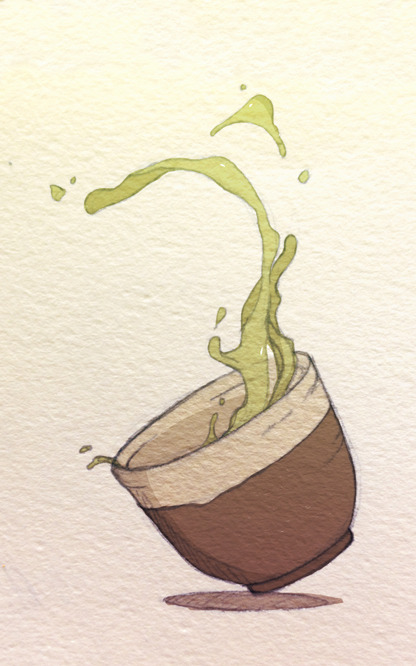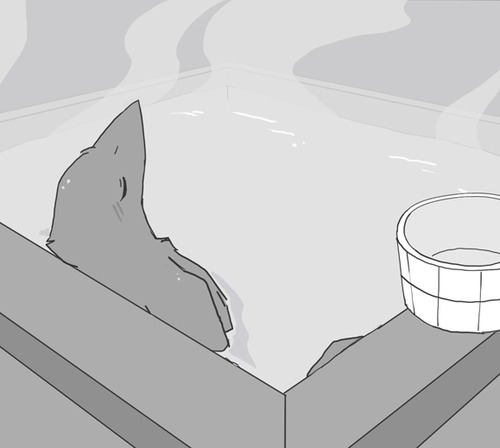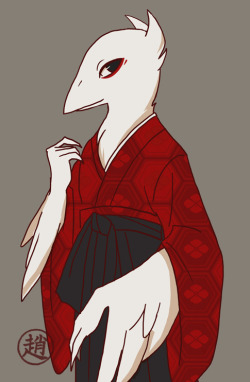
Thank you yapitori and randomtengureporter for proofreading this for me!
…if you find a mistake blame them.
De jisuk - Source 31juil.2013


Commentaires: 0
Posts forum: 0
Level: 1,
Prochain niveau dans 50 xp
Niveau: noob
Experience: 0
Points de traducteur: 0
Suivre une BD par email

Thank you yapitori and randomtengureporter for proofreading this for me!
…if you find a mistake blame them.
Simple Animation: “Fuurai Sisters" (by hakailer)
I had to rush to get this done ASAP, but….I wish I had more time to make it better.
But I’m done! Ahaha! [blood everywhere]
Yuki you are so pro, this came out great!
Karasu — the story that takes place 90% in a bath tub, yet somehow manages to be horribly un-sexy. *confetti*

Karasu — the story that takes place 90% in a bath tub, yet somehow manages to be horribly un-sexy. *confetti*
shanthepillager :
Hey, I just wanted to say that I read your book Fishbones, and it was the most amazing thing I have ever read. I don't know, but there is just something about it that drives me crazy. I hardly cry over books, but this brought me to tears. I love to write to, and lately I haven't been feeling it, but I'm gonna start again now. I hope you never stop writing, and your book was the best investment I have ever made. You should try and get it published. Well, thank you so, so much.
Reponse:
Wow, I’m incredibly flattered! I’m so happy to hear that you’ll be writing again and were able to find a bit of inspiration. I guess this is a good time to announce that I will be self-publishing Fishbones through Kickstarter. I have some work to do before I put it up, though, so if anyone is willing to do a thorough proofreading please message me!

A few people asked, so here is Chiyo’s tengu form… which she will probably just use to troll Shichi from now on.
randomtengureporter :
[[Headcanon; Tengu don't get Friend-zoned... They get White Caked.]]
Reponse:

Accepted.
Tengu Holidays
Tengu Holidays
In Japan at this time, people followed the lunar calendar (the solar calendar wasn’t implemented until the Meiji Era). So I am just going to give the solar equivalent to these days for each holiday.
A few holidays are based on actual Japanese celebrations (such as the observance of Valentines Day and White Day), while others are entirely made up. I may add more holidays later on, but this is what I have for the time being.
Anyway, I hope you guys find this interesting!
Winter
Jan 1 - New Years: If possible, villagers visit nearby temples to give offerings and prayers. Similar to human custom, temple bells are rung 108 times to represent the 108 earthly desires which cause suffering (to cast them off one by one). Families spend time together and feast, play games, etc. Homes and businesses are given a thorough cleaning (similar to spring cleaning).
Feb 1 - Day of Gifts: Having had all winter to build up attractions to village boys, female tengu give daifuku (sweet rice cakes) to males to indicate their interest. They are made in one of four colors, with each color representative of their intent.
White: Platonic/gratitude — for friends and family. The only color given by tengu living in temples (and the only color Shichi has ever received). Usually used to show friendly affection, but can also be used to reject a pushy male.
Pink: Interest in a seasonal/casual relationship. Yes, a “seasonal relationship" means exactly what you think it means. Popular males will receive armloads of these.
Ginger Red: Indicates romantic interest.
Green: Indicates interest in a committed relationship/forming a family. Almost equal to a proposal and normally only given between tengu who are already a couple. The color green is representative of the color of tengu eggs.
Feb 8 - Day of Pairing: Males have one week to consider their feelings and reply with colored daifuku of their own. A matching color indicates similar feelings. No response at all, or, for example, a white mochi in response to a red one, is considered a rejection.
Feb-Mar (varies by village) - Cold Egg Day: When eggs are laid, fertilized eggs are described as ‘hot’ while duds are labeled ‘cold.’ On this day, all cold eggs are cremated (despite never having carried life). This is an exclusively female holiday. Village women gather in private to share tea and stories during the ceremony.
Feb-Mar (varies by village/individual) - First Egg Day: Young girls who have laid their first egg (almost never ‘hot,’ as they are too young for that) are celebrated, wearing green kimono and eating green colored foods (such as kabocha, Japanese pumpkins which are green on the outside and gold on the inside).
Spring
Mar 20 - Day of Seeds (Spring Equinox): Seeds and bulbs are planted around village and temple grounds, weather permitting. Picnics or hikes are popular on this day. Sesame seeds saved from the previous summer are used in sweets and candies.
May 15 - Guard Day: Young tengu display their abilities in weapon use and combat with performances and competitions. The best few are chosen as new village guards, which is considered an honor.
Summer
June 20 - Hatching Day: Because all eggs are laid at nearly the same time, most tengu are born in this month. A holiday with two purposes, Hatching Day celebrates new hatchlings, as well as serving as a “birthday" for older tengu. Rather than celebrate each individual day, all hatching days are observed on this single day. Because tengu live for so long, anyone older than 20 is only recognized every decade (30, 40, etc). Every 100 years is an especially noted event, usually honored with a feast.
July 15 - Day of Ancestors: Nearly identical to Obon, this is a day for honoring one’s ancestors. Grave sites are visited, dances are performed, and lanterns are floated down rivers to represent ancestral spirits.
Aug (varies by village) - Molting Week: The last seven days of this three week process is the most miserable week of the year for all tengu. This is a far cry from a ‘celebration.’ Instead, it is an excuse to stay indoors, out of public eye, and suffer in privacy. Shops and schools close and social excursions are avoided. Because every feather is replaced, this is a very energy-consuming process. In the peak of molting, tengu are terribly unattractive. To top it off, tengu deal very poorly with hot weather as they have high body temperatures, are unable to sweat, and are covered in black feathers (and August is quite hot). Most only leave their homes to bathe in rivers or lakes as the cool water helps with the heat and feather loss.
Autumn
Sept 22 - Autumn Equinox: A harvest festival with a very heavy emphasis on drinking. A forgotten harvest festival is considered a good harvest festival.
Dec 7 - Day of Songs: This marks the start of the breeding season, though instincts are relatively low this early on. Villages gather together in the evening for performances with musical instruments. Males (and occasionally females) show off their voices by singing. Men who cannot sing sometimes offer trinkets or food to compensate.
